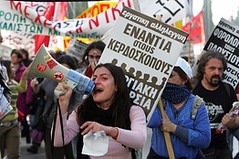
Greece workers have engaged in several general strikes over the last few weeks in repsonse to austerity measures being imposed stemming from the global economic crisis within the world capitalist system. The crisis threatens the eurozone and US markets.
Originally uploaded by Pan-African News Wire File Photos
Eurozone finance ministers say Dublin must decide itself whether to request a bailout
Last Modified: 17 Nov 2010 01:30 GMT
The eurozone crisis threatens EU survival, Van Rompuy said ahead of a meeting of finance ministers
A meeting of European finance ministers has ended without an agreement to bail out debt-stricken Ireland.
However, EU officials said they have "intensified" preparations for potential support for the country's troubled banking sector.
Representatives of the EU, the European Central Bank and the International Monetary Fund will travel to Ireland this week to determine what to do about the banks, said Irish Finance Minister Brian Lenihan.
Held in Brussels, the Belgian capital on Tuesday, the meeting called to grapple with an exploding debt crisis that has already brought Greece to its knees, and now threatens Ireland and Portugal.
Concerns that Ireland will be unable to pay the cost of rescuing its banks - which ran into trouble when the country's real estate boom collapsed - has worsened Europe's government debt crisis.
Markets have pushed up borrowing costs for other vulnerable nations such as Portugal and Spain and threatened to destabilise the common euro currency.
There was speculation that the Irish government itself might be forced to take a bailout like the one that saved Greece from defaulting on its bonds in May.
But the government in Dublin said it does not need one, although there has been discussion of help for its banks.
"The Irish authorities are committed to working" with the EU, the European Central Bank and the International Monetary Fund to "determine the best way to provide any necessary support to address market risks, especially as regards the troubled banking sector," Olli Rehn, the head of EU monetary affairs, said.
"This can be regarded an in intensification of preparations of a potential programme in case it is requested and deemed necessary."
Ahead of the meeting, Herman Van Rompuy, the EU president, said that the bloc will not survive if it fails to overcome a debt crisis plaguing the euro single currency area.
Van Rompuy said that the EU and eurozone were in danger from alarm in the financial markets.
"We all have to work together in order to survive with the eurozone, because if we don't survive with the eurozone we will not survive with the European Union," Van Rompuy said in a speech.
He also said he was "very confident" the EU would overcome the crisis, thanks to "courageous measures" taken by states "to reduce expenses at a time of populism, despite massive protests on the street and knowing they risk electoral defeat."
Ireland 'fully funded'
Van Rompuy's warning raised the stakes after an admission by Ireland that it was holding talks about a possible rescue, six months after international partners had to rush to aid Greece with a $150bn bailout.
Brian Cowen, the country's prime minister, sought to reassure the Irish public, saying the government was fully funded until mid-2011, and that it was only the banks may need help.
There are fears that Ireland's market turmoil could trigger a domino effect that could topple other vulnerable nations like Portugal.
Portugal has warned that it is at "high" risk of needing financial support, unable to borrow money on open markets other than at prohibitive rates, partly because tension over Ireland is increasing pressure on other weak eurozone members.
George Papandreou, the Greek prime minister, also facing new problems over conditions attached to the rescue for Greece, has said he has support from Nicolas Sarkozy, the French president, to re-schedule bailout repayments.
The three countries are only the weakest links in a chain of debt coursing through the 16 nations that share the euro currency, with almost every other member of the European Union bursting at fiscal seams.
Steps to normalisation
Analysts expect the ECB to announce "further steps towards normalisation of its money market operations" at the start of December, Callow added.
Ireland's public deficit this year is set to pass 30 per cent of GDP, 10 times the permitted EU limit and double last year's Greek deficit.
Its plight - which stems from Irish banks' massive over-exposure to busted property markets - is causing consternation among those who would have to guarantee rescue loans.
While drawing up massive new spending cuts to be announced within weeks, Ireland has sought desperately to resist the onslaught from euro doubters.
Experts say Dublin will need about $95bn, and Jean-Claude Juncker, the Eurogroup head, along with the ECB, the European Commission and the International Monetary Fund each say they are ready to act "as soon as possible" if asked.
Others are feeling the heat - with Spain also under pressure going into a bond sale on Tuesday.
Twenty-four of the EU's 27 states are currently running deficits way above EU limits. Bond yields for Ireland, Portugal and Greece all remain high.
The speculation is hurting the euro, which may be a minor blessing in disguise for exporters, and markets will again be watched closely over the course of the day.
Europe's top stock markets fell at the start of trading on Tuesday, with London's benchmark FTSE 100 index, Frankfurt's DAX 30 and the Paris CAC 40 each shedding value.
Source: Agencies
No comments:
Post a Comment